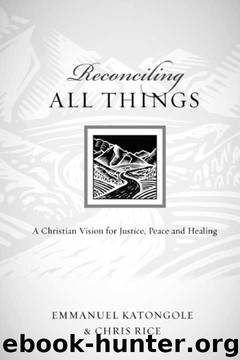Reconciling All Things: A Christian Vision for Justice, Peace and Healing (Resources for Reconciliation) by Emmanuel Katongole;Chris Rice

Author:Emmanuel Katongole;Chris Rice
Language: eng
Format: epub
Published: 2009-10-16T11:42:00+00:00
GOING TO RAMAH: UNLEARNING DISTANCE
Closely related to the problem of speed is the problem of distance from suffering. The bookends of lament in Matthew's Gospel press us to come close to particular places to stand at Ramah beside Rachel, at Calvary beside Jesus. Lament forces us to see the horror of killing and dying there, to feel disturbed by the cries of abandonment and to understand what is at stake in coming alongside and tarrying with pain in concrete places and people.
Learning to lament does not happen anywhere, but somewhere. Like real estate, lament is about location, location, location.
The lament of Israel's psalmist erupts from Babylon, not the Promised Land. "Sometimes I feel like a motherless child" cannot be truthfully felt and sung by just anyone, anywhere. It must be felt and remembered from the location where it originated the social margins of America during slavery. Cries and prayers of lament come from the afflicted, not the comfortable. Lament is the language of people and places who know they are in crisis and not in control.
At a Duke Divinity School forum after the September 11, 2001, attacks, Old Testament professor Ellen Davis cautioned that prayers of lament in Scripture were not written by the world's powerful but by those at the margins who knew they were not in control. While the loss of 9/11 was horrific, Ellen warned that America, with its great military might, should not turn the psalmists' words into the nation's words.
Why are those who are named "oppressed," "poor" and "the least of these" so prominent throughout Scripture? Perhaps to show us that God draws very near to the most vulnerable not because they're any less sinful, but because they are the most sinned against. They are the ones most likely to be lamenting. By telling the truth about brokenness, we too learn to lament. When we draw near to those who are most sinned against, our call is not first to "make a difference" but to allow the pain of that encounter to disturb us.
We know a young woman who graduated from an Ivy League school and came to study at Duke Divinity School on a presti gious scholarship. She had big plans to lead a justice movement from within the church and become the "female Martin Luther King." During her studies, though, she got involved with the Rutba House community, a small group of Christians who live an undramatic but intentionally engaged life in Walltown, one of Durham's most marginalized neighborhoods. Getting to know people who struggled with their lives against poverty, racism and addiction, she experienced a transformation. In her own words, she gave up on "master plans." She decided she needed to change as much as the people she thought she was helping, so she decided to move into the neighborhood and spend the rest of her life there.
Download
This site does not store any files on its server. We only index and link to content provided by other sites. Please contact the content providers to delete copyright contents if any and email us, we'll remove relevant links or contents immediately.
| Codependency | Conflict Management |
| Dating | Divorce |
| Friendship | Interpersonal Relations |
| Love & Loss | Love & Romance |
| Marriage | Mate Seeking |
The 5 Love Languages: The Secret to Love That Lasts by Gary Chapman(9418)
Doing It: Let's Talk About Sex... by Hannah Witton(9113)
Should I Stay or Should I Go? by Ramani Durvasula(7474)
The Road Less Traveled by M. Scott Peck(7390)
The Lost Art of Listening by Michael P. Nichols(7289)
Daring Greatly by Brene Brown(6309)
Beartown by Fredrik Backman(5456)
We Need to Talk by Celeste Headlee(5452)
Men In Love by Nancy Friday(5044)
The Rules Do Not Apply by Ariel Levy(4671)
The State of Affairs by Esther Perel(4538)
How To Win Friends and Influence People by Dale Carnegie(4368)
Reflections Of A Man by Mr. Amari Soul(4168)
Pillow Thoughts by Courtney Peppernell(4107)
The Ethical Slut by Janet W. Hardy(4094)
Algedonic by r.h. Sin(3931)
He's Just Not That Into You by Greg Behrendt & Liz Tuccillo(3760)
I Love You But I Don't Trust You by Mira Kirshenbaum(3741)
Finding My Forever by Heidi McLaughlin(3698)
